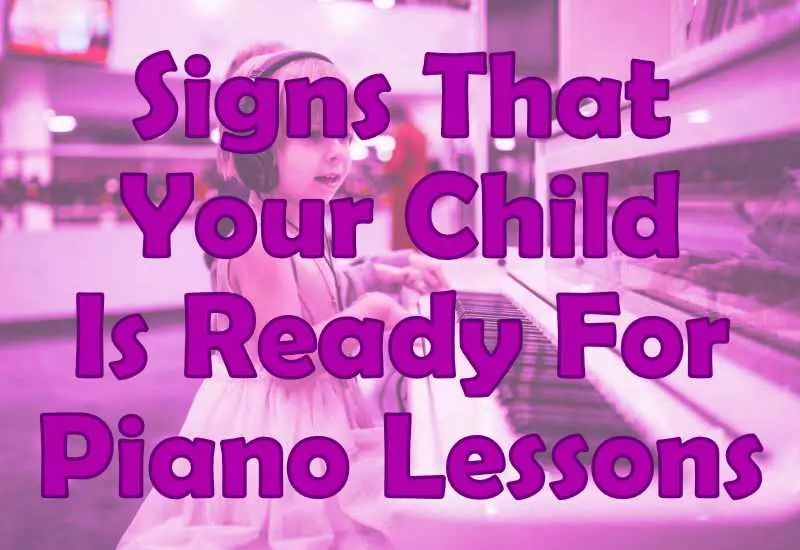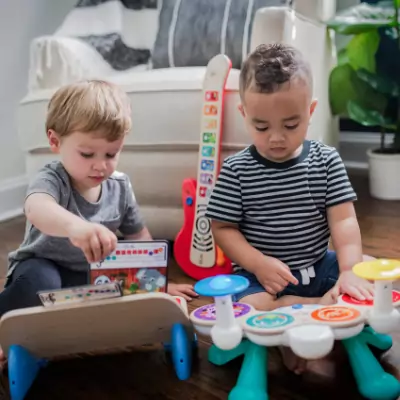Signs That Your Child Is Ready for Piano Lessons

What are the Signs that your Toddler is Ready for Piano Lessons?
Suppose your toddler starts to tinkle that ol’ acoustic piano sitting in your living room. Your eyes sparkle and the realization dawns on you—it’s time for piano lessons! How easy it would be if every parent can get a cue like this.
For those of you who are still left wondering whether to get your children into learning the piano, we’re taking notes from experience and sharing the signs that your child is ready for piano lessons.
We need to look at readiness in a holistic manner since piano playing is a complex skill. This means that the child should be ready mentally, emotionally, and physically.
Related: Are you interested in babies and toddlers brain growth? Read my article on the impact of musical instruments for babies development.
Mental Readiness
- Can the child tell between their left and right hands? Upon interview, piano teachers will ask whether the child knows his left to right since the instructions will involve hand positioning. As simple as it sounds, this is the starting point of hand independence and coordination exercises crucial in playing the piano.
- Does the child know their alphabet or at least the letters A to G? Are they confused with the order of these letters? The learner will be dealing with a lot of these letters as part of note naming and basic sheet music reading.
- Can the child read? Many sheet music will have lyrics on them that the student will have to sing during practice.
- Can the child count? Counting is not only for numbering the fingers. It will also account for the number of notes in a scale, triads, beats, and so on and so forth.
- Does the child accept guidance and instruction? Part of mental preparedness is allowing oneself to be taught. Can the child handle being told what to do or given small tasks to perform?
Emotional Readiness
-
Does the child enjoy sitting and playing the piano? It is pretty much a breeze if the learner loves learning the instrument. If not, the teacher will have a hard time making them concentrate on the task. Even the most creative and fun teacher may fail in instilling appreciation and love for playing music if the child’s heart is not in it.
- Can the child handle remaining still for the duration of the lesson? Some lessons can be as long as 20-30 minutes and it only increases from there. It would be a lot easier if the student is patient during the activity. This is a big consideration if your child is starting very young and haven’t developed patience.
- Is the child is able to focus on the task at hand? A lot of the lessons in the beginning will require the learner’s undivided attention. Note naming, a fundamental lesson in music, needs memorization in the beginning.
Physical Readiness
- Has the child established fine motor skills needed in pressing the piano keys? Since the piano keys look similar and sit close to each other, the dilemma is whether the learner is pressing precise keys as instructed. You can find out if the child has developed this motor skill if he colors nicely within the lines in his art books.
- Are the child’s fingers strong enough for pushing the keys? A related question is whether the child can control the press as pushing the keys at different forces produces different loudness and softness.
- Can the child distinguish sounds? It may be a little while for a learner to identify the notes through the sounds, but can the learner hear when accidentally hitting a wrong note in the middle of a run? The more advanced question is if the child is pitch-perfect.
Note that these readiness questions are not directly pointing to an age where most of these, if not all, are already developed. We believe that every child develops at their own speed, and that preferred ages of starting are not absolute. But, as a parent, if you have seen these signs yourself and have thought of getting your child into piano lessons, we have a few things you need to ask yourself, too.
- Are you prepared to give some time and energy to your child’s lessons? The formal lessons are just short in the beginning and are finite. What happens after the teacher has left the house also counts in the progress of the learner. Sometimes, parents are also included in the child’s training even only for basic skills such as reading and counting.
- Do you have a piano at home or are you willing to buy one? If you are taking your child to the piano teacher’s place or classroom, what happens when the lesson is done? What if there’s a long break before the next learning session? The skill sticks better if your child can practice at home.
- Are you prepared to give your child the space necessary for him to practice? The beginning of the piano lessons will need as much focus, silence, and nurturing environment.
I hope to have helped you in finding out if your child is ready for piano lessons.
Remember: There is no standard age to start learning the piano.
Parents, Teachers & Sheet Music Seekers:
If I offered to provide you hundreds of legit sheet music PDFs for your kids:
- Brand-New & Exclusive Compositions
- Age & Level Appropriate
- With INSTANT Online Access
- Worry-FREE Licensing & Copyright
...would you take me up on that offer?
ABOUT
I started Music4Kids with a simple goal in mind: To provide valuable information to guiding parents who want to raise musically inclined kids.
Click to read on
